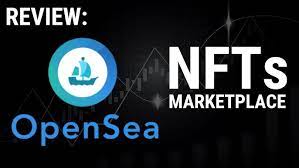OpenSea, often hailed as the eBay of blockchain assets, Opensea has rapidly become a pivotal player in the realm of NFTs (Non-Fungible Tokens). As the largest decentralized marketplace for buying, selling, and discovering digital collectibles and other blockchain-based assets, OpenSea has revolutionized how digital ownership is perceived and transacted. This article delves into the unique aspects of OpenSea and its impact on the ever-evolving NFT ecosystem.
What is OpenSea?
Founded in 2017 by Alex Atallah and Devin Finzer, OpenSea is built on Ethereum’s blockchain, providing a platform where users can trade NFTs without intermediaries. NFTs are unique cryptographic assets representing ownership of specific digital items, ranging from art and music to domain names and virtual real estate. Unlike cryptocurrencies such as Bitcoin or Ethereum, NFTs are indivisible and unique, making platforms like OpenSea indispensable for their trade.
Key Features of OpenSea
- Wide Range of Assets OpenSea supports a diverse range of digital assets, including:
- Digital Art: Unique pieces created by artists worldwide.
- Gaming Items: Virtual goods for use within blockchain games.
- Domain Names: Blockchain-based domains like
.ethaddresses. - Virtual Real Estate: Parcels of land in metaverse platforms such as Decentraland or The Sandbox.
- Music and Video: Tokenized audio and visual content.
- Decentralization and Security OpenSea operates on Ethereum’s blockchain, ensuring transparency and security through smart contracts. This decentralized approach eliminates the need for a central authority, giving users full control over their assets.
- Cross-Blockchain Compatibility Beyond Ethereum, OpenSea has integrated blockchains like Polygon and Solana to provide cheaper and faster transactions. This flexibility makes the platform accessible to a broader audience.
- User-Friendly Interface OpenSea’s intuitive design allows both novice and experienced users to navigate the marketplace with ease. Features like wallet integration and filters simplify the buying and selling process.
- Minting Capabilities Artists and creators can mint NFTs directly on the platform without coding expertise. OpenSea supports lazy minting, enabling creators to list NFTs without upfront gas fees.
The Impact of OpenSea on the NFT Market
- Democratizing Digital Ownership OpenSea has lowered the barrier to entry for creators and collectors by simplifying the NFT creation and trading processes. Artists, musicians, and even brands have leveraged the platform to monetize their work directly.
- Empowering Creators With royalties programmed into NFTs, creators on OpenSea can earn a percentage of each resale, fostering sustainable revenue streams.
- Cultural Shift OpenSea has played a significant role in popularizing NFTs, driving mainstream adoption. Celebrities, athletes, and large corporations have used the platform to engage with their audiences in innovative ways.
- Economic Impact The marketplace has catalyzed the rise of a new digital economy, creating opportunities for creators, developers, and investors.
Challenges and Criticisms
While OpenSea has garnered acclaim, it is not without challenges:
- High Gas Fees: Transactions on Ethereum can be costly during network congestion, deterring smaller investors.
- Fraud and Counterfeits: The platform has faced issues with plagiarized content and fake NFTs.
- Centralization Concerns: Despite its decentralized aspirations, some users criticize OpenSea’s reliance on centralized decision-making, such as banning certain collections.
The Future of OpenSea
As the NFT market evolves, OpenSea is poised to remain at its forefront by embracing new technologies, improving user experience, and addressing community concerns. With advancements like Layer 2 solutions and multi-chain support, OpenSea aims to make NFT trading more accessible, efficient, and sustainable.
Moreover, as Web3 and the metaverse gain traction, OpenSea’s role in enabling digital ownership will become even more critical. Whether it’s virtual concert tickets, digital fashion, or metaverse land, OpenSea is well-positioned to facilitate the next wave of innovation.
Conclusion
OpenSea has redefined the landscape of digital ownership, serving as a bridge between creators and collectors in the NFT space. While challenges remain, its contributions to the digital economy are undeniable. As the platform continues to evolve, it holds the potential to unlock new opportunities in a decentralized and interconnected digital world.
For those looking to dive into the world of NFTs, OpenSea is not just a marketplace—it’s a gateway to the future of digital innovation.


